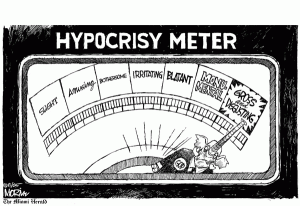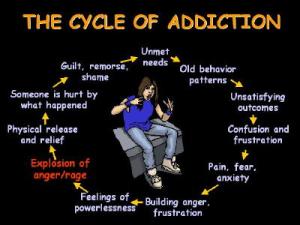 One
of the greatest and most longstanding scientific debates revolves
around human socialization and how much we can attribute to nature
versus nurture. In other words, are we born with pre-existing
dispositions to certain kinds of behaviours, attitudes and actions based
on our genetic code/evolutionary past? OR are we purely determined by
the environment(s) in which we’re raised? If a combination of both, what
role do one’s peers, parents and other social influences, such as the
media, play in terms of bringing out or repressing certain hardwired
traits? Interestingly, the very same questions can be asked when it
comes to the realm of psychological maturity.
One
of the greatest and most longstanding scientific debates revolves
around human socialization and how much we can attribute to nature
versus nurture. In other words, are we born with pre-existing
dispositions to certain kinds of behaviours, attitudes and actions based
on our genetic code/evolutionary past? OR are we purely determined by
the environment(s) in which we’re raised? If a combination of both, what
role do one’s peers, parents and other social influences, such as the
media, play in terms of bringing out or repressing certain hardwired
traits? Interestingly, the very same questions can be asked when it
comes to the realm of psychological maturity. Are some inherently born with characteristics more in line with psychological maturity? OR does everyone come to the table with the same capacity for developing psychological maturity but one’s experiences (and how one learns from and copes with them) determine if/when said attitude is embraced? Further, how much should one allow him/herself to be influenced by factors outside of the self (ie: externalization) versus listening to one’s brains (ie: remember there’s one in your head AND one in your gut)?
I’m afraid there are no easy answers to any of the above queries and in fact part of your journey to establishing (and maintaining) a psychologically mature perspective may just consist of you attempting to find solutions ;) The point in doing so however would NOT be to come up with definitive “end results”, but instead to evaluate and analyze the process that took you there.
Yes, once again, my friends, it all comes back to introspection: asking yourself what makes you tick and understanding why/how it all comes together. As I said in my very first column, if any of your self-contemplations result in superficial because “you’ve been told to” or “that’s just how it’s always been” types of answers, you’re NOT digging deep enough. EVERYTHING, no matter how seemingly mundane, has meaning and motive behind it. Don’t forget that. Equally important to remember is the fact that no one enters your life unscathed or without baggage of some sort trailing behind. So, if you find yourself feeling threatened by another, instead of lashing out, ask yourself why – it’ll serve you much better and help you become a much more considerate, empathetic individual; something I think we all should strive to be.
Even those of you who’ve been practising the principles I’ve discussed this past year for a long time including: minimizing defensive reactions and focussing on long-term gratification, among others, I’m sure, still find yourselves in situations with individuals who are “difficult” to say the least. You’ll come to realize that the biggest dilemma you’ll ultimately face in life is the fact that just because you’re reasonable and willing to deal with situations in an “adult” manner, doesn’t necessarily mean that everyone else is singing from the same songbook…if you get my drift. Not to quote myself unnecessarily but the truth of the matter is that “some people are just content being assholes;” this obviously proves particularly contentious when said individuals are a necessary evil in your life (ie: stepparents and/or monsters-in-law). Of course, this brings me to the topic of stress; something else we’ve thoroughly discussed.
While some stress can be helpful and motivating, too much can lead to emotional overload and/or self-implosion. Life is all about balance and honestly acknowledging your limitations. There’s no cowardice or shame in admitting when you need help or a break. Confidence and a “can do” attitude will get you far, but too much pride is just another issue waiting to bite you in the ass.
As we revealed in our dissections of many pathological “personality types” such as: the “people pleaser”, “egoist”, “pessimist” and “hypocrite”, insecurity as well as a lack of gratitude appear to be two common root causes. Considering we live in one of the most privileged areas of the globe, it’s hard to think as to why the latter would be the case at all. Priorities people! As for the former? Well no two people’s situations are alike, but it seems to me that bullying (by BOTH authority figures and peers) along with the promotion of unattainable social ideals of what define “happiness”, “success” and “beauty” are a serious part of the problem.
In the end, everything comes down to one simple, hard and fast question: Are YOU happy? If you are, take stock of all of the wonderful reasons why, never take such things for granted and be sure to acknowledge all of those who’ve/who continue to contribute joy to your existence. If you’re conflicted, dissatisfied, stressed, sad or angry more often than you think you SHOULD be/more than you WANT to be, it’s time to seriously start asking yourself some deep questions: Who am I? Why am I this kind of individual? Who do I want to be? What do I want in life? What do I need to get there? What drives me? What discourages me? Who/what supports me? Who/what stands in my way? Only YOU can ask and only YOU can answer.
I’m sorry to say there are no magical solutions or 10-step instructional manuals outlining how one can obtain a life in which they’re “living” rather than simply “existing”. While many individuals will enter and exit your life as your journey unravels (for the better and sometimes for the worse), remember it’s ultimately YOUR life - you need to look out for YOURSELF first and foremost – and that YOU have the power to lead the kind of life you desire. It’s all about your ATTITUDE, so, in closing, get out your wrenches and start adjusting.











